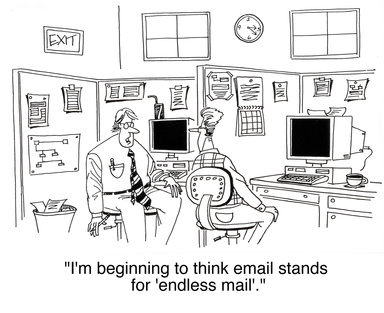Do you really know how much time you waste each day online? Really? Various studies show you probably spend much more time achieving nothing than you might think. For instance, we are spending around one hour a day on search engines getting nowhere – fruitlessly searching, re-searching and visiting loads of useless links in an attempt to find something, anything which will help us. Then we spend about an hour a day dealing with emails which are worthless – spam, “cc’d” messages and newsletters which we read, but do nothing with as a result. On top of all this, there is the distraction from Tweets, Facebook and LinkedIn, all giving us interesting titbits and links to “useful” stuff which we dutifully go off and read, before getting back to work – and then having a peek at the latest viral video we’ve been alerted to. We are doing several hours LESS work a day than we were doing 20 years ago. No wonder the economy is in trouble.

But it’s not just the economy; it’s our own bank balances. If one thing is established, it is that focus works. Companies that seek to diversify usually return back to their focus after years of experimenting before someone says “is this really our core business?” and then they sell off all the peripheral “diversification”. True, their turnover often falls, but their profitability frequently rises.
Similarly, if you are at a business networking meeting you’ll find it easy to understand the one-minute pitch from the focused person and less easy to get to grips with the person who’s company appears to do anything for anyone.
And if you were to attend a webinar on “marketing with social media” you might learn a great deal, but you would probably find more practical information from separate webinars on “marketing with Facebook” and “marketing with Twitter”.
The more focused and “niched” things are, the easier we understand them – and that is frequently associated with greater profitability. Similarly, for productivity in the workplace when we focus on our work and don’t get distracted by the bing bong of emails or Tweets, we are more productive. And generally, the more productive we are, the more profitable we are.
This is highlighted in recent research which shows that students who complete their degrees in a short period of time earn more money in later life than people who take longer to finish their studies. This is because their studying is focused – they are not distracted by the other activities they could be doing. It is another example of how focus leads to more money.
In terms of your business it means you need a strategy for focus. Having a time of day – the only time of day – when you deal with emails, for instance, will make you more focused, more productive and more profitable. Similarly if you timetable your social media use, you will boost your productivity by being more focused. In other words, spending the day online and flitting from this to that, reduces your focus, harms your productivity and reduces your bank balance to boot.
Related articles
- Productivity: Four Strategies for Minimizing Distractions (passingthru.com)
- 4 Distraction Pitfalls and How to Avoid Them (lifehack.org)
- How to Get Super Focused (by Michael Hyatt) (markconner.typepad.com)

